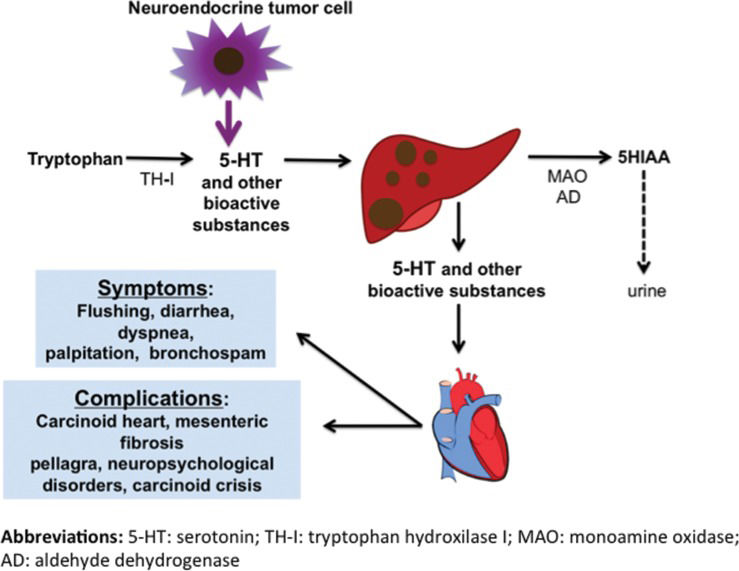Carcinoid Syndrome

Carcinoid Syndrome
Carcinoid syndrome is a rare condition caused by the secretion of serotonin and other vasoactive substances from carcinoid tumors, a type of neuroendocrine tumor (NET) most commonly found in the gastrointestinal tract or lungs. It typically occurs in patients with advanced tumors that have metastasized to the liver, allowing these substances to bypass liver metabolism and enter systemic circulation.
Causes
- Caused by carcinoid tumors secreting serotonin, kinins, histamine, and other bioactive amines into the bloodstream.
- Most often associated with midgut NETs (small intestine, appendix, colon, rectum), bronchial carcinoids, and rarely pancreatic NETs.
- Liver metastases prevent inactivation of secreted substances, leading to systemic symptoms.
Symptoms
- Flushing: Episodic, often involving the face and upper chest, caused by transient vasodilation; occurs in about 75% of cases.
- Diarrhea: Frequent, watery stools due to increased intestinal secretion and motility.
- Wheezing and bronchospasm: Respiratory symptoms resembling asthma.
- Abdominal cramping and pain
- Palpitations and tachycardia
- Telangiectasia: Small dilated blood vessels on the skin.
- Weight loss and fatigue
- Niacin deficiency (pellagra): Due to serotonin synthesis depleting tryptophan, leading to dermatitis, diarrhea, and dementia.
- Carcinoid heart disease: Fibrosis of heart valves, particularly right-sided, causing valvular dysfunction.
- Carcinoid crisis: A severe, potentially life-threatening episode with flushing, hypotension or hypertension, arrhythmias, bronchospasm, and hyperthermia, often triggered by stress or surgery.
Diagnosis
- Elevated 24-hour urinary 5-hydroxyindoleacetic acid (5-HIAA), a serotonin metabolite, is a key diagnostic marker.
- Elevated serum chromogranin A levels, especially with liver metastases.
- Imaging (CT, MRI) to locate primary tumor and metastases.
- Functional imaging with somatostatin receptor scintigraphy (octreotide scan) or PET scans.
- Clinical history and symptom assessment are essential.
Treatment
- Surgical resection: Removal of primary tumor and metastases if feasible.
- Somatostatin analogs (octreotide, lanreotide): Mainstay of symptom control, reducing hormone secretion and tumor growth.
- Symptom management:
- Antidiarrheal agents
- Bronchodilators for wheezing
- Medications to widen airways
- Peptide receptor radionuclide therapy (PRRT): Targeted radiotherapy for inoperable or metastatic tumors.
- Liver-directed therapies: Embolization or ablation for liver metastases.
- Chemotherapy: Generally reserved for high-grade or poorly differentiated NETs.
- Management of carcinoid crisis: Intravenous octreotide, corticosteroids, and supportive care during surgery or stress.
Prognosis
- Early detection and complete tumor resection offer the best outcomes.
- Advanced metastatic disease carries a guarded prognosis but can be managed to improve quality of life.
- Carcinoid heart disease significantly impacts morbidity and mortality.
Summary Table
| Aspect | Details |
|---|---|
| Cause | Serotonin and vasoactive substance secretion by carcinoid tumors, usually with liver metastases |
| Common Tumor Sites | Gastrointestinal tract (small intestine, appendix, colon, rectum), lungs, pancreas |
| Key Symptoms | Flushing, diarrhea, wheezing, abdominal pain, palpitations, carcinoid heart disease, carcinoid crisis |
| Diagnostic Tests | Urinary 5-HIAA, serum chromogranin A, imaging (CT, MRI, octreotide scan) |
| Treatment | Surgery, somatostatin analogs, symptom management, PRRT, liver-directed therapies, chemotherapy |
| Complications | Carcinoid heart disease, carcinoid crisis, niacin deficiency (pellagra) |
Consult with Our Team of Experts Now!
At DrStemCellsThailand (DRSCT)‘s Anti-Aging and Regenerative Medicine Center of Thailand, we emphasize comprehensive evaluations and personalized treatment plans of Cellular Therapy and Stem Cells for managing various health conditions. If you have questions about Carcinoid Syndrome or would like more information on our services, consult with our experts today!
Consult with Our Team of Experts Now!
References
- Pavel M, Öberg K, Falconi M, et al. “Carcinoid syndrome: update on the pathophysiology and treatment.” Clinics (Sao Paulo). 2022;77:100131.
DOI: 10.1016/j.clinsp.2022.100131
Carcinoid syndrome is a complex paraneoplastic condition caused by hormone secretion from neuroendocrine tumors, leading to characteristic symptoms like flushing and diarrhea. Management focuses on controlling hormone effects and treating the underlying tumor.















